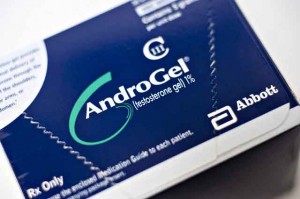Testosterone Heart Attack Risk Could be Linked to Calcium Build-Up
 Amid concerns that use of testosterone products like Androgel could lead to a higher risk of heart attack, a new study sheds light on why that link may be present. Scientists in the United Kingdom have found that testosterone could lead to calcium build-up in the blood, which could increase the risk for artery blockages and heart attacks.
Amid concerns that use of testosterone products like Androgel could lead to a higher risk of heart attack, a new study sheds light on why that link may be present. Scientists in the United Kingdom have found that testosterone could lead to calcium build-up in the blood, which could increase the risk for artery blockages and heart attacks.
The study, which was recently published in the journal Scientific Reports, set out to find a reason behind the increased incidence of heart attacks in men. Researchers looked specifically at how testosterone affected the blood vessel tissue in mice, discovering that testosterone may be the culprit in triggering calcium build-up inside the vessels. The calcification was directly attributed to the testosterone since scientists determined that removing the androgen receptors led to less calcium production.
Testosterone, calcium and heart attack risks
Calcification leads to narrowing and hardening of the blood vessel, which makes it harder for the heart to pump blood through the vascular system. It can also lead to problems with the heart valves. These issues can increase the possibility of a heart attack or other types of heart problems.
The researchers in this study pointed out that their findings came from a relatively small sample and that more studies will be needed to form a conclusive link between testosterone, calcification and heart attack risk. However, their findings support previous studies that have linked use of testosterone drugs with a higher incidence of heart attack. Testosterone drugs, which were originally approved for the treatment of low testosterone levels due to hypogonadism, have been prescribed off-label for men suffering testosterone reductions due to other reasons, including the aging process.
More studies indicate risks
The first study, which was published in the Journal of the American Medical Association in 2013, found that some men that took testosterone therapy like Androgel after a coronary angiogram were more likely to suffer a stroke, heart attack or death after the procedure. A 2014 study published in PLoSOne expanded on those findings with the discovery that men age 65 and over had double the risk of heart attack when they took testosterone drugs.
In 2015, a study published in Pharmacotherapy found that men who took testosterone for the first time had a 40 percent higher risk for heart attack than men that did not use testosterone products. These study findings led to an FDA safety communication warning regarding the potential side effects of testosterone therapy. The agency noted that the drugs have only been approved for men who have low testosterone levels as a result of diagnosed medical conditions and not the aging process alone. The FDA further advised that these drugs have been linked to a possible increase in heart attacks and strokes.
Litigation continues to grow
Men who have been injured from the use of these testosterone drugs have begun to seek legal action against the manufacturers of these products. Plaintiffs are alleging Low T supplements have led to serious injuries like heart attack and that the manufacturers have failed to provide proper warning about the risks.
Federal testosterone lawsuits involving Androgel, Testim and Axiron have now been coordinated into multidistrict litigation in U.S. District Court for the Northern District of Illinois. An MDL may be established when there are a growing number of cases with common statements of fact for the purpose of streamlining early trial proceedings.
- Scientific Reports, Ablation of the Androgen Receptor from Vascular Smooth Cells Demonstrates a Role for Testosterone in Vascular Calcification, http://www.nature.com/articles/srep24807
- Online Library Wiley, Pharmacotherapy, Testosterone Therapy and Risk of Myocardial Infarction: A Pharmacoepidemiologic Study, http://onlinelibrary.wiley.com/doi/10.1002/phar.1534/abstract
- PLOS One, Increased Risk of Non-Fatal Myocardial Infarction Following Testosterone Therapy Prescription in Men, http://journals.plos.org/plosone/article?id=10.1371/journal.pone.0085805
- FDA, Drug Safety Communication: FDA Cautions about Using Testosterone Products for Low Testosterone Due to Aging; Requires Labeling Change to Inform of Possible Increased Risk of Heart Attack and Stroke with Use, http://www.fda.gov/Drugs/DrugSafety/ucm436259.htm


 Resources
Resources
 Resources
Resources
